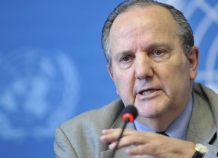Tortures are practiced regularly in Tajikistan and it is difficult to say whether number of these cases increases from year to year or have a tendency to reduce. Nevertheless, tortures are practiced quite regularly, UN Special Rapporteur on torture Juan Mendez told the reporters on May 18 in Dushanbe at the end of his nine-day visit to Tajikistan.
Furthermore, confessions gained through torture remain main investigation method for Tajik law enforcement structures and prosecutor authorities.
UN Special Rapporteur said the task to reach high level of crime detection, which is set for inquiry and investigation bodies, leads to practice of torture when confessions need to be obtained through all possible ways.
“I visited 17 closed institutions throughout the country, talked to prisoners in private, talked to victims of tortures in offices of local right defenders. I made the following preliminary conclusions: prisoners suffer from pressure in Tajikistan very often. This pressure has different forms, including threats, beating, use of electric shock,” UN Special Rapporteur said.
He believes that guaranteed access of lawyer to detainees from the moment of his/her detention will significantly reduce or even remove such phenomena.
UN Special Rapporteur said courts often ignore torture appeals filed by detainees. “In accordance with the UN Convention against tortures, Criminal and procedural code guarantees that confessions obtained through tortures can not be used for criminal investigation. However, even though this norm has come into force, courts never use it to exclude confessions gained through unauthorized methods,” Mendez has said.
He said lawyers told him about several cases when their clients tried to deny their confessions which, they claimed, were gained through tortures, but courts never take their complaints into account.
“Despite clear standards specified in the international law, there are no independent structures to investigate tortures,” Mendez stressed.
He also pointed at low professional level of medical workers who conduct medical examination of victims of tortures. “Lack of skilled specialists and required equipment, incomplete or faked-up reports of medical experts on tortures, dependence of experts on law enforcement authorities show once again that there is a need to set up an independent institute to carry out medical examinations,” Mendez said.
UN Special Rapporteur said that on May 18 he met with Tajikistan President Emomali Rahmon and told the President that persons who serve their life sentences do not have social contact with members of their families, they are only allowed to have short family visits during which they meet with members of their families through glass. “The entire system of life imprisonment is based on a very limited contact with the prisoners, including cases when prisoners serve their sentences in solitary confinement,” Mendez said.
At the same time he stressed that in the past two years Tajikistan introduced a series of changes into its normative structure and recent introduction of the ‘torture’ article into the Criminal Code is one of the most important changes.
“I’m going to prepare a more detailed report for the Government of Tajikistan and will include a series of recommendations that will allow reduce the number of tortures,” he added.




